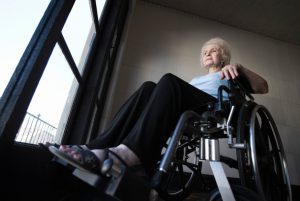The Guide to The 7 Stages of Dementia
If you or a loved one has recently been diagnosed with the condition, it is essential to learn about the various stages of dementia. Typically, people are diagnosed early on, before the disease has progressed. It is common to feel anxious, overwhelmed, and fearful during this time. Understanding what to expect throughout all 7 stages of dementia can help you and your family prepare for what is ahead.
Symptoms of the Early Stages of Dementia
The early stages of dementia may take some time to notice. If an individual does not voice concern to loved ones or their doctor about symptoms, family members and friends often do not associate the first dementia stages with the condition. However, it is important to be aware of the symptoms.
The first symptoms in the seven dementia stages include mood changes, frequently forgetting words or having trouble finishing sentences, being repetitious, having difficulty concentrating or following stories, often getting lost or becoming confused as to where one is, becoming irritated at change, loss of short-term memory, and having trouble completing daily routines.
As the condition progresses, these symptoms intensify and become more apparent.
The 7 Stages of Dementia
After you recognize the early stages of dementia, it is important to be prepared for what will happen in the future. There are 7 stages of dementia, and you must understand each of the dementia stages. It will help you or your loved ones make plans for the coming years, providing comfort in what is a challenging time.
The definition of dementia stages is used by doctors to help define how far the condition has progressed and more easily describe what symptoms to expect. It may be surprising, but the first three dementia stages are officially diagnosed as “no dementia.” Every person starts in stage one when no symptoms are present.
Dementia Stages Two and Three
The second and third stages of dementia remain diagnosed as having “no dementia,” though mild symptoms may present. Stage two is said to be “very mild cognitive decline,” which is marked by minor forgetfulness that everyone experiences as they age. Examples include forgetting where one placed their car keys or not being able to recall the name of an old friend.
The third stage of dementia, still diagnosed as “no dementia,” is marked by “very mild cognitive decline.” The third stage of dementia may last anywhere from 2 to 7 years before progressing. Individuals become increasingly forgetful, experience difficulty concentrating, get lost more easily, and experience a loss of words. It is during this stage where loved ones may begin to notice a difference.
Dementia Stage Four
Stage four of dementia is known as the “early stage,” which lasts an average of two years. It is noted as “moderate cognitive decline,” and individuals may begin to forget recent experiences or conversations, and be unable to find new locations when traveling. They may become depressed and withdrawn, have trouble socializing, and have difficulty managing their finances.
Dementia Stages Five and Six
Stages five and six are known as “mid-stage dementia,” and they last an average of 18 months and 2.5 years, respectively. Stage five marks moderately severe cognitive decline and loved ones may need help caring for themselves. During this stage, they may forget significant life events, such as the death of a spouse. Stage six marks severe cognitive decline. During this stage, it is almost certain that an individual will need help completing activities such as bathing, dressing, and cooking.
Stage six can be an overwhelming time for family members, as it is when individuals may start to forget the names of their children, close friends, and have virtually no memory of recent events. They may revert back to memories of early childhood, become delusional, lose their ability to speak, experience incontinence, exhibit obsessive-compulsive behaviors, and become easily agitated. It is during this stage that extra care becomes necessary, possibly in a professional setting.
Dementia Stage Seven
Late-stage dementia is extremely difficult for family members. It is marked by an individual’s inability to speak, and they may lose the ability to walk or go to the bathroom by themselves. End-of-life care and planning are necessary during this stage of dementia.
What Causes Dementia?
Dementia is often used as a catch-all term for a variety of conditions that result in chronic cognitive decline. It can be a symptom of different diseases or brain disorders and is not a disease itself. The most significant risk factor for developing dementia is age. In people aged 65 years or older, 10% of the population presents with the diagnosis. By the age of 85, that percentage rises to approximately 33%.
The condition may be under-diagnosed in younger adults as the early signs of dementia can be hard to spot at first. Sometimes, individuals recognize early stage dementia in themselves but delay seeking medical care due to fear or denial.
Dementia is associated with the degeneration of brain cells that cannot be replaced. Once brain cell degeneration begins, it cannot be reversed and progresses as time goes by. It may be caused by prior head trauma, stroke, or brain tumors. There is some evidence that the condition is genetic, and often a cause cannot be determined.
There are several different forms of dementia:
- Alzheimer’s Disease
- Vascular Dementia
- Frontotemporal Dementia
- Lewy Body Dementia
- Creutzfeldt-Jakob Disease
Nearly 85% of all dementia cases are deemed to be Alzheimer’s Disease. Lewy Body Dementia is another one of the most common forms. Vascular dementia typically results from brain damage incurred during a stroke. Creutzfeldt-Jakob Disease is extremely rare, and there are less than 350 cases diagnosed in the United States each year.
How to Care for a Loved One with Dementia
A loved one with dementia’s needs will change the further the condition progresses. In the very early stages, they may not need much, if any, assistance. However, having a family member or close friend nearby is crucial. It may be necessary to prevent them from driving and avoid leaving them alone for extended periods.
The most important thing to do is to recognize when your loved one’s needs are changing so that you can help them in the best way possible. Many individuals choose to have a loved one with dementia move in with them. Or, they may hire a home health aide or transition them to an assisted living facility where all of their needs will be met. Eventually, you may need to look into how to select the best hospice care.
Each individual’s case will be unique, and there is no one-size-fits-all care plan for those who have dementia. It’s also essential that you learn how to help yourself work through the grief of your loved one’s decline.
Activities to Help Dementia Patients
Many family members enjoy participating in activities with their loved ones that may help with the symptoms of dementia. Many patients, no matter which of the 7 stages of dementia they are currently in, find comfort and relief in discussing their lives. Often, having a loved one to sit and talk to is of great help while they reminisce.
Consult your physician, as there may be physical activities, such as water aerobics, they recommend to help your loved one stay active. Taking a walk around the local park or neighborhood, past familiar places, can also be soothing and beneficial.
If your loved one has a favorite game, such as chess or cards, sit with them and engage in the activity. It helps stimulate their minds while providing them a sense of happiness. Other activities that can be relaxing and help those with dementia include cooking and spending time with animals.
End-of-Life Planning
End-of-life planning is often the most challenging aspect of dementia that loved ones must accept. It is a highly emotional, sad, and frightening time. The average survival time after an individual is diagnosed is 4.5 years, though some may live another twenty years. As there is no way to predict how long the condition will take to progress, it is better to start planning as soon as possible.
If your loved one is still in the very early stages of dementia, it may be the right time to speak with them about funeral pre-planning and pre-funding. The pre-planning process allows an individual with the opportunity to ensure that all their final wishes will be met and can provide a sense of peace. It can be a difficult conversation to have, but it is an important one.
If you or a loved one require pre-planning services, contact The Gardens of Boca Raton to schedule a private, in-person consultation.



